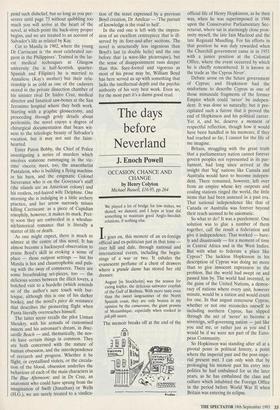The days before Neverland
J. Enoch Powell
OCCASION, CHANCE AND CHANGE by Henry Colyton Michael Russell, (16.95, pp.264 We played a lot of bridge for low stakes, we skated, we danced, and I hope at least did something to maintain good Anglo-Swedish relations, if nothing else.
It goes on, this memoir of an ex-foreign official and ex-politician just in that tone over hill and dale, through national and international events, including the begin- nings of a war or two. It exhales the evanescent perfume of a chest of drawers where a grande dame has stored her old
dresses:
August [in Stockholm] was the season for eating kraftor, the delicious saltwater crayfish of the Gulf of Bothnia. With more taste even than the sweet langoustines of the North Spanish coast, they are only beaten in my opinion by the camaroens, the giant prawns of Mozambique, especially when cooked in pill pill sauce.
The memoir breaks off at the end of the official life of Henry Hopkinson, as he then was, when he was superimposed in 1946 upon the Conservative Parliamentary Sec- retariat, where sat in alarmingly close prox- imity myself, the late lain Macleod and the late Reginald Maudling. For his efforts in that position he was duly rewarded when the Churchill government came in in 1951 with a junior position at the Colonial Office, where the event occurred by which he is chiefly remembered. It is known in the trade as 'the Cyprus Never'.
Debate arose on the future government of Cyprus; and Hopkinson had the misfortune to describe Cyprus as one of those minuscule fragments of the former Empire which could 'never' be indepen- dent. It was done so naturally; but it pre- cipitated such a furore that it proved the end of Hopkinson and his political career. Yet it, and he, deserve a moment of respectful reflection, though how it would have been handled in his memoirs, if they had reached so far, I cannot for the life of me imagine.
Britain, struggling with the great truth that a parliamentary nation cannot forever govern peoples not represented in its par- liament, had long since arrived at the insight that 'big' nations like Canada and Australia would have to become indepen- dent. There remained, however, left over from an empire whose key outposts and coaling stations ringed the world, the little items that had been annexed in a past era. That national independence like that of Canada or Australia was forever beyond their reach seemed to be axiomatic.
So what to do? It was a puzzlement. One solution was to glue a number of them together, call the result a federation and give it independence. That worked — bare- ly and disastrously — for a moment of time in Central Africa and in the West Indies. But with what to federate a place like Cyprus? The luckless Hopkinson in his description of Cyprus was doing no more than to give innocent expression to the problem. But the world had swept on and passed him by. The world had invented, in the guise of the United Nations, a democ- racy of nations where every unit, however minute, would be a nation and would count for one. In that august concourse Cyprus, whether or not one reconciles oneself to including northern Cyprus, has slipped through the net of 'never' to become a sovereign, self-governing nation — just like you and me, or rather just as you and I would be if we were not part of the Euro- pean Community.
So Hopkinson was standing after all at a pivotal point in political history, a point where the imperial past and the post-impe- rial present met. I can only wish that by prolonging his memoir past his entry into politics he had embalmed for us the later years, as he has embalmed the class and culture which inhabited the Foreign Office in the period before World War II when Britain was entering its eclipse.


































































 Previous page
Previous page